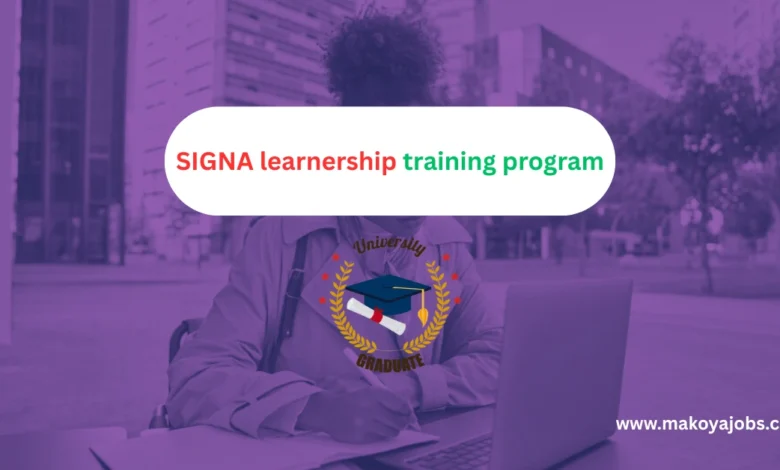Why Should You Apply for SIGNA Learnership Training Programme in South Africa?

Getting skills that matter can open big doors for your future. In South Africa, where unemployment is high and opportunities can be limited, choosing the right training program makes all the difference. The SIGNA learnership training program offers a way to gain valuable skills, stand out in job markets, and give back to the community. It’s more than just training—it’s a chance to grow personally and professionally. If you’re thinking about your next move, this opportunity might be exactly what you need.
What is the SIGNA Learnership Training Programme?
Overview of SIGNA and Its Mission
SIGNA, or the South African Institute of Sign Language Interpreters and Advocates, was started to support deaf people and promote sign language. Their goal is to help deaf individuals live more independent lives. They work hard to train interpreters and raise awareness about deaf rights, making sure the community gets noticed and respected. Through SIGNA, many individuals have found a way to turn their passion for sign language into a career.
Structure and Duration of the Programme
The learnership lasts for a specific period—usually around 12 months—giving learners enough time to learn and practice new skills. During this time, trainees get hands-on experience like interpreting in real settings, advocacy, and community work. You’ll earn certifications that show what you’ve learned and what you can do. This practical approach helps prepare you for the actual job market.
Eligibility Criteria and Application Process
Anyone interested in making a difference can apply. Usually, applicants need at least a Matric certificate and fluency in sign language or a strong interest in learning. The application process involves filling out forms, submitting a CV, and sometimes providing a letter of motivation. Deadlines are strict, so make sure to check SIGNA’s website or contact them early. Gather your documents, show your passion, and follow the steps carefully.
Benefits of Applying for the SIGNA Learnership
Skill Development and Industry Preparation
The program offers specialized training in sign language interpretation—an in-demand skill in many sectors. You’ll learn how to communicate effectively with deaf clients, assist in healthcare, education, and public services. Plus, real-world placements give you a taste of what working in this field really looks like.
Employment Opportunities and Career Advancement
Having a certification from SIGNA boosts your chances of finding a good job quickly. Many sectors—like hospitals, schools, government agencies, and private companies—are actively hiring interpreters and advocates. Being part of a recognized program means you’ll have a solid network of contacts to tap into. This can lead to promotions and long-term career growth.
Certification and Recognition
Completing the program gives you a qualification that is respected both locally and internationally. It proves you’ve trained in a professional setting, giving you greater credibility. This recognition builds your confidence and helps you stand out, whether in employment or starting your own business.
Contribution to Social Inclusion and Advocacy
Joining the program isn’t just about personal growth—it’s a way to make a real difference. You help deaf people access vital services and participate fully in society. Many graduates find leadership roles and become community advocates, pushing for equal rights and better understanding.
Why SIGNA Learnership Offers an Edge Over Other Programs
Unique Focus on Sign Language and Deaf Advocacy
- Unlike general skills courses, SIGNA’s program specializes in sign language and advocacy.
- This focused approach makes you a true expert ready for specific jobs.
- SUBMIT APPLICATION
- It’s like choosing a niche that’s in high demand.
Partnerships and Industry Links
SIGNA has strong ties with government agencies, NGOs, and private businesses. These partnerships open doors for placements and job referrals. The real-world experience you gain here beats theoretical learning any day.
Support Structures and Mentorship
Training doesn’t end when the program finishes. Many learners get ongoing mentorship to help them excel. This support helps you stay motivated, learn from seasoned professionals, and continue growing even after completing the program.
Successful Alumni Stories
Graduates of SIGNA’s learnership have gone on to secure meaningful jobs. Some have become lead interpreters, advocates for deaf rights, or started community projects. These stories prove that with passion and training, you can make a difference in your community and beyond.
How to Maximize Your Chances of Success
Preparing a Strong Application
Show your enthusiasm and commitment. Highlight any experience you have with sign language or community work. Clear, well-organized applications stand out. Proofreading and following instructions carefully also increase your chances.
Making the Most of the Training
Attend every class and practice regularly. Don’t be shy to ask questions or seek extra help. Build relationships with your trainers and peers—they could be your future colleagues or mentors. Take every opportunity to get involved.
Post-Training Strategies
Keep learning even after the program. Attend workshops, join professional bodies, and stay updated with new techniques. Use your certification to find jobs or consider starting your own interpreting service. Networking is key—connect with industry contacts online and at events.
Conclusion
Applying for the SIGNA learnership training program is a smart move for anyone passionate about sign language and deaf advocacy. It provides the skills, certification, and confidence needed to excel. More importantly, it’s a chance to contribute positively by supporting a community that often faces unfair challenges. If you’re ready to grow — personally, professionally, and socially — explore the application process now and take that first step toward a meaningful career.

